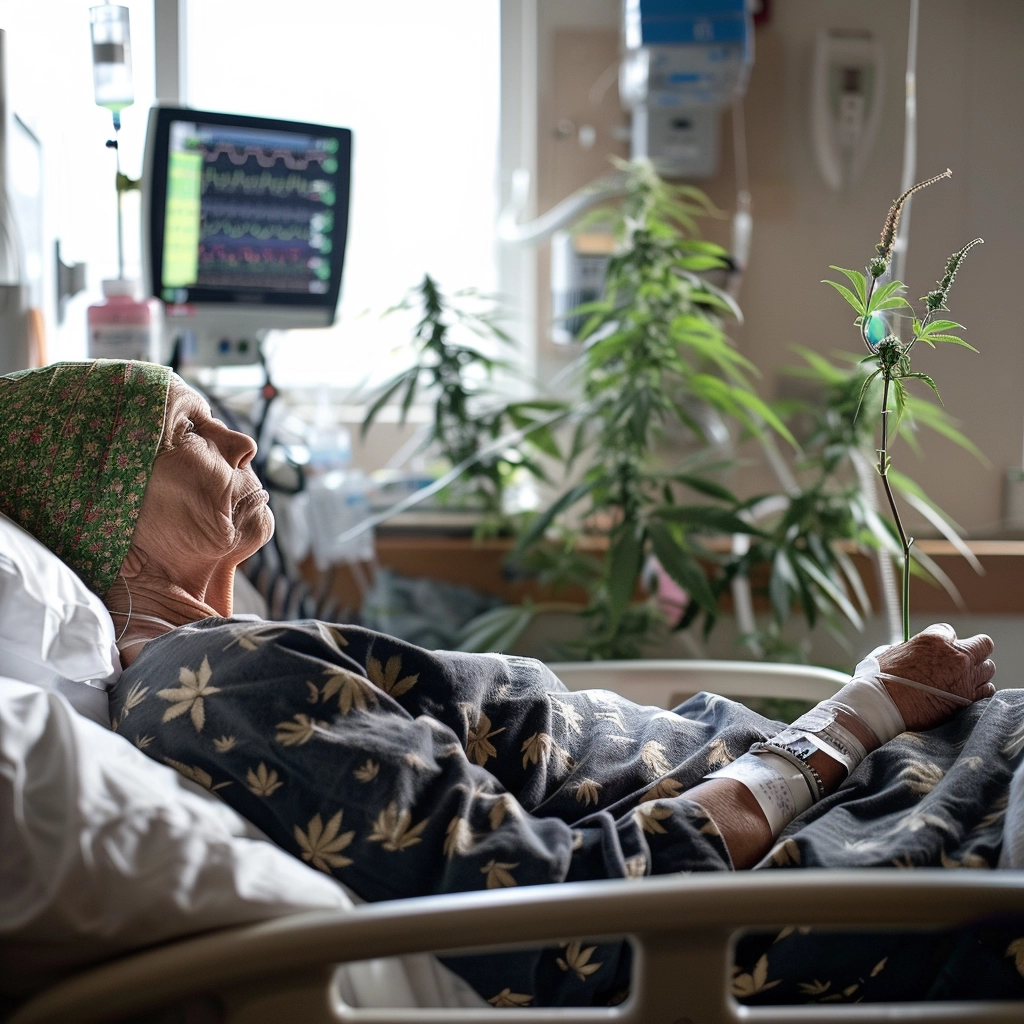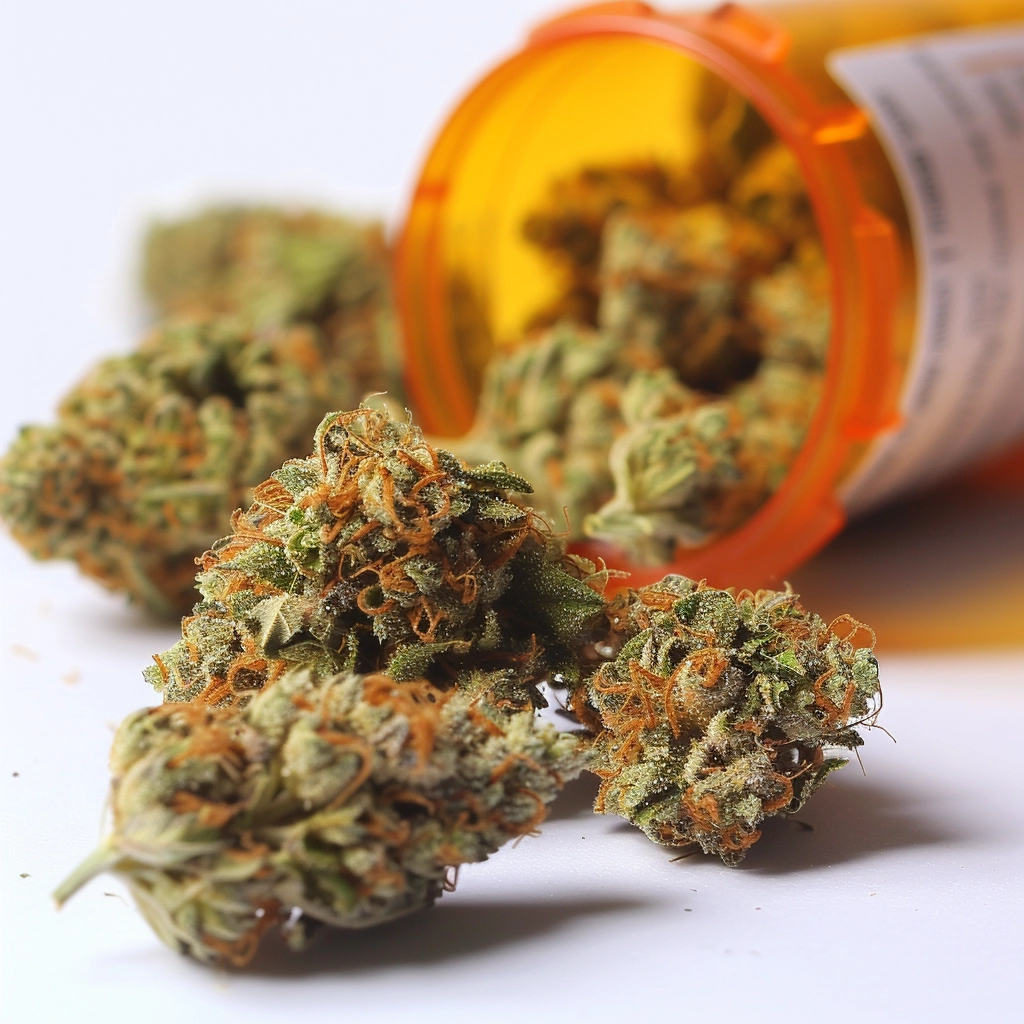In the vast and complex battlefield of cancer treatment, managing symptoms and improving quality of life have become just as crucial as combating the disease itself. As the medical community continues to explore innovative ways to alleviate the burdens of cancer, medical cannabis has emerged as a significant ally. With its multifaceted capabilities to ease pain, quell nausea, stimulate appetite, and soothe anxiety, cannabis is reshaping the approach to cancer symptom management, providing hope and comfort to those in the throes of this challenging disease.


Table of Contents
ToggleA New Horizon in Cancer Care
Cancer and its conventional treatments, such as chemotherapy, radiation, and surgery, often bring with them a daunting array of side effects, from debilitating nausea and vomiting to chronic pain and profound fatigue. As research deepens and stigma fades, the integration of medical cannabis into cancer care protocols is offering a new horizon of relief for patients, heralding a more compassionate approach to cancer symptom management.
Cannabis and Pain Relief: Easing the Burden
Pain is one of the most common and severe symptoms experienced by cancer patients, often resulting from the disease itself or the aggressive treatments required to combat it. Traditional painkillers, including opioids, are frequently prescribed but come with significant drawbacks such as dependency risks and undesirable side effects. Cannabis, particularly strains rich in THC (tetrahydrocannabinol) and CBD (cannabidiol), offers a potent alternative. These cannabinoids engage the endocannabinoid system, reducing pain by altering pain perception pathways in the brain, providing substantial relief without the heavy toll of opioids.
Combating Nausea and Stimulating Appetite
Nausea and vomiting are particularly prevalent among patients undergoing chemotherapy, significantly impacting their ability to maintain proper nutrition and quality of life. Cannabis has been shown to effectively counteract these symptoms; THC activates receptors in the brain’s nausea control pathway, reducing feelings of sickness while encouraging a return to normal eating patterns. This antiemetic effect was pivotal in the early medical adoption of cannabis, with synthetic cannabinoids like dronabinol and nabilone being FDA-approved for this purpose.
An Antidote to Anxiety and Depression
The psychological toll of cancer, characterized by significant levels of anxiety and depression, can be as debilitating as the physical symptoms. CBD is renowned for its anxiolytic properties without the psychoactive effects associated with THC. Its ability to elevate mood and provide a sense of calm is invaluable for cancer patients, helping them cope with the emotional and psychological stresses of their diagnosis and treatment.


The Science Behind the Relief
The efficacy of cannabis in cancer symptom management is supported by a growing body of scientific research. These studies highlight the role of cannabinoids in modulating pain, nausea, appetite, and mood — critical components of the cancer patient’s journey.
The Role of the Endocannabinoid System
The endocannabinoid system (ECS) plays a crucial role in maintaining bodily homeostasis and is involved in managing pain, hunger, and emotional wellbeing. Cannabinoids from cannabis interact with this system, offering a natural means of symptom relief. The body’s own endocannabinoids, similar in structure to those found in cannabis, act as signals in the nervous system to help regulate inflammation and neuronal activity. By mimicking these compounds, cannabinoids from cannabis can effectively ease inflammation and interrupt pain signals.


Challenges and Considerations
While the therapeutic potential of cannabis is immense, there are challenges and considerations that must be navigated to maximize its efficacy and ensure patient safety.
Legal and Regulatory Issues
Despite growing acceptance, the legal status of cannabis still varies significantly across different regions, affecting access for many patients who could benefit from its use. Furthermore, the lack of standardization in dosing and potency can make it difficult for healthcare providers to prescribe and monitor its use effectively.
Customizing Cannabis Treatment
Given the complex nature of cancer and its treatment, personalizing cannabis therapy to suit individual patient needs is crucial. This involves careful selection of cannabinoid profiles, dosing, and methods of administration, tailored to the specific symptoms and treatment side effects experienced by the patient.
Conclusion: A Compassionate Ally in Cancer Care
Medical cannabis is proving to be a valuable and versatile tool in the management of cancer symptoms, significantly enhancing the quality of life for many patients. As research continues to advance and societal perceptions evolve, cannabis is poised to play an increasingly prominent role in cancer care, transforming the therapeutic landscape and offering a gentler path through one of life’s most challenging journeys.
FAQ: Medical Cannabis in Cancer Symptom Management
How does medical cannabis help in managing cancer symptoms?
Medical cannabis helps manage various cancer symptoms by interacting with the body’s endocannabinoid system, which plays a key role in regulating pain, appetite, mood, and nausea. THC is particularly effective at reducing nausea and stimulating appetite, while CBD is known for its ability to alleviate anxiety and inflammation without psychoactive effects.
Is medical cannabis safe for cancer patients?
Yes, when used under the guidance of a healthcare provider, medical cannabis is generally considered safe for cancer patients. However, like all treatments, it has potential side effects, such as dizziness, dry mouth, and in the case of THC, psychoactive effects. It’s important for patients to start with low doses and adjust based on their response and the presence of any side effects.
Can medical cannabis cure cancer?
There is no scientific evidence that cannabis can cure cancer. Its use in cancer care is primarily for symptom management — helping to alleviate pain, nausea, loss of appetite, and anxiety that often accompany cancer and its treatment.
How is medical cannabis administered for cancer symptom management?
Medical cannabis can be administered in several forms, including oils, capsules, edibles, tinctures, and vaporized flower. The choice of administration often depends on the patient’s preference, the specific symptoms being treated, and the desired speed of onset. For instance, inhalation provides rapid relief, while edibles may offer longer-lasting effects.
What are the legal considerations for using medical cannabis in cancer care?
The legal status of medical cannabis varies by jurisdiction. In places where it is legal, patients typically require a prescription from a qualified healthcare provider. Patients should consult local regulations and obtain cannabis from licensed dispensaries where quality and dosage are regulated.
Does insurance cover medical cannabis for cancer symptom management?
In most regions, medical cannabis is not covered by health insurance due to its classification under federal law and the lack of FDA approval, except for specific synthetic cannabinoid medications like dronabinol and nabilone. Patients are advised to check with their insurance provider for more details.
Are there any specific cannabinoids that are especially beneficial for cancer patients?
THC and CBD are the most studied cannabinoids for cancer symptom management. THC is particularly useful for reducing nausea and stimulating appetite, while CBD is favored for its ability to manage anxiety and pain without causing a high. Many patients benefit from formulations that include both THC and CBD to take advantage of their synergistic effects.
How do cancer patients start using medical cannabis?
Cancer patients interested in using medical cannabis should consult with a healthcare provider who has experience in cannabis medicine. The provider can evaluate the patient’s specific symptoms, treatment history, and potential drug interactions, and recommend an appropriate cannabis treatment plan.
Can medical cannabis be used alongside chemotherapy and other cancer treatments?
Yes, medical cannabis is often used in conjunction with conventional cancer treatments like chemotherapy. It can help manage the side effects of these treatments and improve overall quality of life. However, it’s crucial to coordinate care with healthcare providers to safely integrate cannabis into the treatment regimen.
What should cancer patients consider before starting medical cannabis?
Cancer patients should consider their overall health, the potential benefits and risks of cannabis, and the legal status of cannabis in their region. Consulting with a healthcare provider experienced in both oncology and cannabis medicine is essential to ensure that the use of cannabis is appropriate and tailored to their individual needs.
These FAQs aim to provide essential insights into the use of medical cannabis for managing symptoms in cancer care, helping patients and their families make informed decisions about incorporating cannabis into their treatment plans.
Kannabu's Online Cannabis Educational Resources
Read Educational Online Guides and Articles to Learn About Cannabis
- Navigating the Green Path: CBD vs. THC in Medical Treatment
- The Aromatic Architects of Healing: The Role of Terpenes in Medical Cannabis
- Navigating the Green Frontier: Clinical Trials on Cannabis and Its Effects
- Charting the Green Path: Cannabis Dosing Guidelines for Medical Use
- The Endocannabinoid System: Nature’s Balancing Act in Human Health
- A Green Horizon: Cannabis as an Alternative to Opioids
- Navigating the Mind’s Garden: Cannabis and Mental Health Treatment
- Unlocking the Green Code: Exploring the Genetic Diversity and Pharmacological Promise of Cannabis
- Weaving Green into Gold: The Integration of Medical Cannabis into Traditional Medicine
- The Therapeutic Promise of Medical Cannabis: Exploring the Spectrum of Cannabinoids
- From Young to Old: The Compassionate Embrace of Medical Cannabis in Pediatric and Geriatric Care
- Green vs. Traditional: Navigating the Crossroads of Medical Cannabis and Conventional Therapies
- Beyond the Pain: The Comparative Effectiveness of Cannabis in Chronic Pain Management
- Unlocking Cannabis’s Secrets: The Journey Through Cannabinoid Pharmacokinetics and Pharmacodynamics
- Green Paws: Navigating the Frontier of Medical Cannabis in Veterinary Care
- Unlocking Relief: The Transformative Role of Medical Cannabis in Pain Management
- Harnessing Harmony: Medical Cannabis and the Battle Against Autoimmune Disorders
- Embracing the Night: How Medical Cannabis Transforms Sleep Management
- Turning the Tide: Cannabis as a Catalyst for Relief and Recovery in Nausea and Appetite Stimulation
- Illuminating the Neural Pathways: The Transformative Role of Medical Cannabis in Neurological Conditions
- Harnessing Harmony: Medical Cannabis and the Battle Against Autoimmune Disorders
- A Clearer View: Medical Cannabis in the Treatment of Glaucoma
- Breaking Boundaries: Cannabis and the New Frontier in Epilepsy and Seizure Control
- Revolutionizing Relief: Medical Cannabis in Cancer Symptom Management
- Navigating the Storm: Cannabis as a Beacon of Hope in Multiple Sclerosis Treatment
- Cannabis: A Natural Respite for Arthritis and Joint Pain
- Healing from Within: The Role of Medical Cannabis in Treating Gastrointestinal Disorders
- Healing Invisible Wounds: Cannabis in PTSD and Trauma Treatment
- Balancing the Mind: The Potential of Medical Cannabis in Bipolar Disorder and Mood Stabilization
- Illuminating the Mind: Cannabis in the Treatment of Alzheimer’s and Neurodegenerative Diseases

